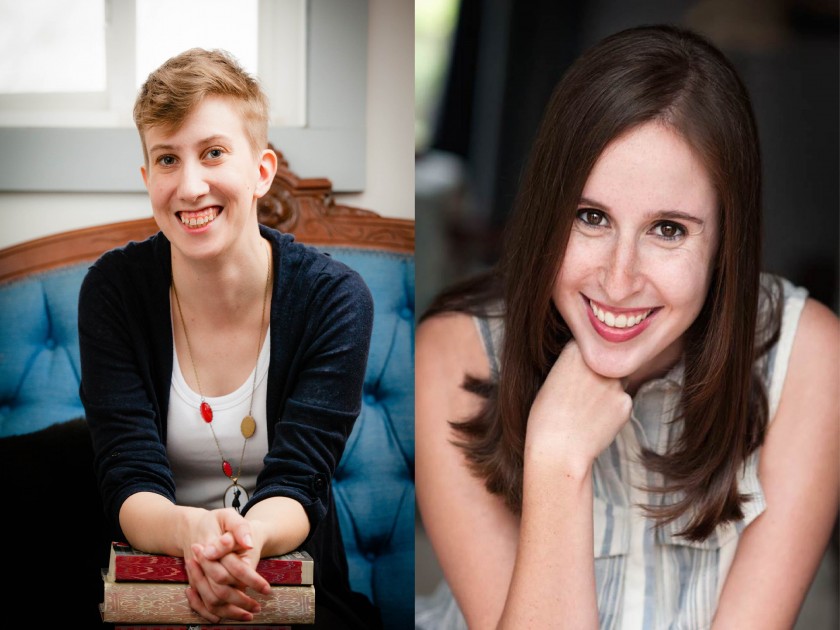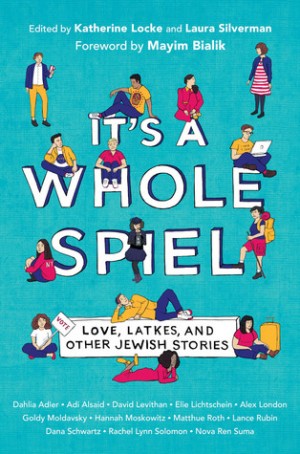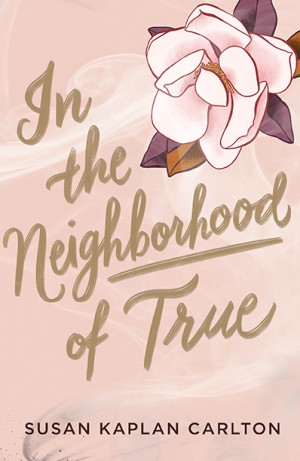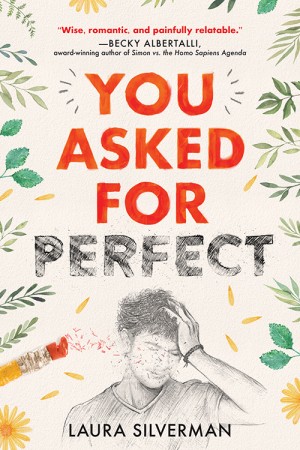
Hello! We’re the editors of (and two of the contributors to) It’s a Whole Spiel, a Young Adult anthology of contemporary Jewish stories written by Jewish young adult authors. It has secular, Reform, Conservative, Modern Orthodox, and Orthodox representation, and we’re very proud of every story in this collection. We interviewed each other to give you an inside look into this anthology, why we made it, and what we hope readers will get from it!
Katherine Locke: Hi Laura! I feel like it’s super important that people know that Spiel was your brain-child. I feel so lucky to be involved and so grateful to be invited as your co-editor. What gave you the idea for Spiel and what made you think of doing an anthology?
Laura Silverman: Hi Katherine! I can’t believe my brain-child is now a real book, and I’m so grateful I had the best co-editor ever at my side throughout this entire process. I’ve been following and supporting the push for diverse YA books for many years now, but for at least the first year, I didn’t even notice my own story was missing from the shelves. Once I recognized the lack of YA books with Jewish characters, I wanted to not only write YA novels with Jewish characters, but I also wanted an anthology to exist so readers could discover a huge array of Jewish teen experiences all at once. What made you say yes to this project?
KL: I can remember exactly where I was when we were talking, but I can’t remember anything past that rush of feeling. I just knew — yes, this was something we could do. I was writing Jewish characters into my YA books already, but it’d never occurred to me that we too could put together an anthology and that it’d be something that people wanted. But it seemed like a really big need the more I thought about it. The other reason I wanted to be involved is I could so clearly see how this would have been a good book for me as a Jewish teen — and for a lot of Jewish teens with my experiences. My Jewish community growing up was secular and Reform. I simultaneously thought that I wasn’t Jewish enough, and that my Jewishness was the best way. Now I have friends with all different Jewish backgrounds and all different ways of observing and practicing Judaism. I wish I’d had those windows into other Jewish experiences when I was younger. It would have made me more open-minded. Instead, as an adult, I had to unpack a lot of my own misconceptions about other ways of being Jewish. And I had to unpack my own fears and insecurities about the ways I practiced my Jewishness as an adult. I want readers to open this book and realize that their way of being Jewish is enough — not superior to or worse than anyone else’s way of being Jewish. What do you want Jewish readers to take away from Spiel And what do you want non-Jewish readers to take away from Spiel?
LS: I think this anthology is a window for Jewish readers to see other Jewish perspectives. Working on and reading through this anthology made me feel more connected to my community than ever. We are of course a relatively small religion, so we shouldn’t let levels of observance divide us into even smaller groups. I hope non-Jewish readers take away joyful Jewish experiences from this anthology. Often Jewish representation is about the trauma of the Holocaust or cruel stereotypes of being greedy or insular, so I hope non-Jewish readers see us as we are — joyous, thoughtful, and giving. Let’s talk stories! Can you talk about one story that really resonated with you — either because it felt similar to your Jewish perspective or because it opened up a new window for you?
KL: I suppose all of them doesn’t really narrow it down or answer the question? I knew when we started this project that I was going to be emotional about it, but it was a really fascinating experience. I’ve never felt more Jewish and less Jewish at the exact same time as I did reading all of the stories. I’m going to pick two that really stood out to me and I can remember vividly how I felt when I was reading them. Dahlia Adler is one of my best friends, but reading “Two Truths and an Oy” felt like I was getting a window into my friend’s life that I hadn’t had — or hadn’t known to look for — previously. Amalia’s experience of feeling too Jewish in a gentile space, and her desperate joy of seeing someone else with a kippah on felt so real, and also a little painful in a way I hadn’t understood before. And the second story was Alex London’s “Indoor Kids” because it felt authentic to my Jewish experiences: that Judaism is always there, subtly or not so subtly shaping my life experiences. I remember texting him when I got to the end and demanding [redacted for spoilers]. It was the kind of story that made me feel bigger on the inside, and that kind of storytelling is, to me, a deeply Jewish tradition. Which stories spoke to you and your experiences, or offered you a window? Did any of the stories surprise you?
LS: I think David Levithan’s “The Hold” spoke the most to my Jewish experience. The opening paragraph of that story is three pages long and speaks to what Jewish is for the character; I identified with so many of those details, especially about feeling the connection to the Mourner’s Kaddish because, like David highlighted, it’s what my great-great-grandparents said, and what my parents say, and what one day someone will say for me. As for a window into new experiences, I really appreciated the stories about not feeling Jewish enough, like Rachel Solomon’s “Aftershocks.” I grew up in a conservative Jewish community and my grandparents were Orthodox, so I didn’t realize what it was to be Jewish without services and b’nai mitzvahs and Shabbat dinners. I think if you only know one experience it can be a slippery slope to conflating your way as the better way. Reading about such a wide range of Jewish experiences provides empathy, curiosity, and brings us all closer together. Okay, final question from me! What’s next? Is there a Jewish story or stories you’re particularly eager to tell?
KL: Oh gosh. There are a thousand Jewish stories I’m eager to tell! I feel like I’m just getting started. I’m so inspired by all the incredible Jewish books I’ve been reading, especially over the last year, and the ways we’re exploring history through a Jewish lens, like In the Neighborhood of True, and the contemporary millennial Orthodox life through Ariel Samson: Freelance Rabbi, and the collision of fantasy and history in The Sisters of the Winter Wood. I’m slowly and carefully making my way into a new historical fantasy — after spending a lot of time in contemporary realms lately! — that is Jewish and messy and complicated and I love it a lot. That’s all I can share right now though! What about you? What’s next on your docket?
LS: Ooh, I just started readingIn the Neighborhood of True this week, and it’s so great already! I feel like I’m just getting started as well! I want to write stories where the characters happen to be Jewish and stories that revolve around their Jewish communities and identities. I wrote a short story for an anthology called Take the Mic highly inspired by my experience with online antisemitism leading up to the 2016 presidential election, and I would be intersted to explore modern antisemitism even more. I grew up in a time and place where I never experienced antisemitism, but in the past few years, it’s been rising up all around me, and I feel like it’s important to address it and push back.
Katherine Locke lives and writes in Philadelphia, where she’s ruled by her feline overlords and her addiction to chai lattes. She writes about that which she cannot do: ballet time travel and magic. When she’s not writing she’s probably tweeting. She not-so-secretly believes most stories are fairy tales in disguise. Her Young Adult debut, The Girl with the Red Balloon, won a 2018 Sydney Taylor Honor Award from the Association of Jewish Libraries and a 2018 Carolyn W. Field Honor Award from the Pennsylvania Library Association. You can find her online @bibliogato on Twitter and Instagram.
Laura Silverman is a writer and editor. She loves books, dogs, and bubble baths. She currently lives in Brooklyn, NY. You can follow her on Twitter @LJSilverman1.



